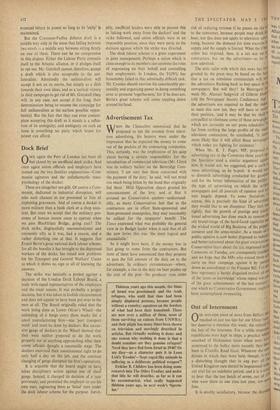Advertisement Tax
WHEN the Chancellor announced that he proposed to tax the revenue from televi- sion advertising, his hearers were under the impression that he expected the money to come out of the pockets of the contracting companies. This, certainly, was the implication of his quip about having a certain responsibility for the introduction of commercial television (Mr. Lloyd was its solitary backer on the Beveridge Com- mittee); '1 am sure that those concerned with the payment of the duty,' he said, 'will not mind too much being bitten by the hand that originally fed them.' Mild Opposition cheers greeted his announcement of the levy, and at first it aroused no Conservative qualms—understand- ably, as many Conservatives feel that as the contractors are in effect State-sponsored and State-protected monopolies, they may reasonably be milked for the taxpayers' benefit. The Times expressed what was probably the general of view in its Budget leader when it said that all the new levies this was 'the most logical and unassailable.' So it might have been, if the money was in fact going to come from the contractors. But have most of them he announced that they propose to pass the full amount of the duty on to the advertisers. In ordinary circumstances—where, for example, a rise in the duty on beer pushes up the cost of the pint—the producer runs some THE SPECTATOR. MAY 5 I 9 risk of reducing revenue if he passes on the m to the consumer, because people may drink beer, but this does not apply to television ad m Using, because the demand for time exceeds. supply and the supply is limited. What the C cellor has imposed, then, is a tax not on, contractors, but on the advertisers—as he now admitted. The stoic calm with which this news has bet greeted by the press may be based on the ho that a tax on television commercials will S the advertisers flocking back to buy space in newspapers. But will they? In Harrogate 1 week Mr. Alastair Sedgwick of Gillette blurt told the Newspaper Society Conference that the advertisers are required to find the malle to meet this new tax, they will have to refit their position, 'and it may be that we shall compelled to eliminate some of those newspoPe which are currently on our press schedules.' far from curbing the large profits of the aisle television contractors, he concluded, 'it see more likely that it will affect those newspaPe which today arc fighting for existence.' When Mr. R. T. Paget, MP, proposed' 11 advertising tax in the Commons three years ag the Spectator used a similar argument agains him. It would not, we suggested, put a curb 01 mass advertising, as he hoped: it would 'tend to diminish advertising conducted for goody' and for the better information of the putili the type of advertising on which the serin, newspapers and all journals of opinion and eel ture largely depend. To some of course, this is precisely the kind of advertise they would like to see disappear. They feel, 8 rightly, that the growth of prestige and in411, tional advertising has done much to removeite` old brand-image of the hard-faced capitalist '11 the wicked world of Big Business, of the MO cornerer and the arms-vendor. As a result of public opinion is now better disposed to Indus' and better-informed about the giant corporan0 Conservative fears about the tax, expressed in Commons on Tuesday, are consequently justitio,, and we hope that the MPs who voiced them PM carry on their campaign against it by pnitit/5 down an amendment to the Finance Bill. For Oro levy represents a barely disguised revival of oEle of the 'taxes on knowledge' whose repeal was 011 of the great achievements of the last century one which no Conservative Government ought to have contemplated re-enacting.






































 Previous page
Previous page